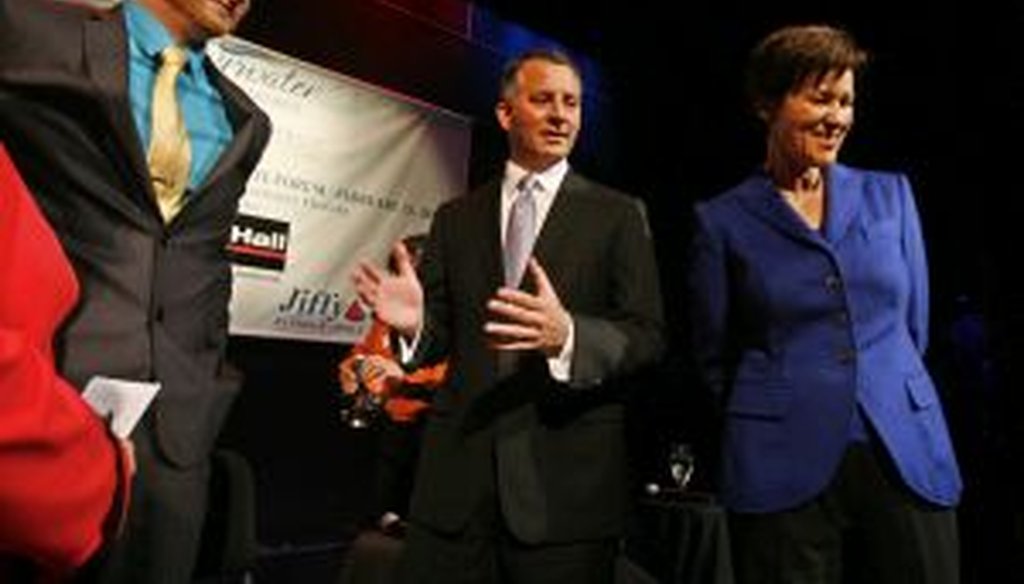Stand up for the facts!
Our only agenda is to publish the truth so you can be an informed participant in democracy.
We need your help.
I would like to contribute

Candidates for Congress in Pinellas County, Florida, appear at a Feb. 25 debate. From left are Libertarian Lucas Overby, Republican David Jolly and Democrat Alex Sink.
Voters are in the home stretch of this winter’s special election for the late U.S Rep. Bill Young’s open congressional seat. Polls open March 11, but early voting has been in full swing for weeks, with Democrat Alex Sink and Republican David Jolly running neck and neck.
There has been no shortage of campaign claims and attack ads for PolitiFact Florida to check, especially with the national parties funneling millions of ad dollars into the Pinellas County race. Libertarian candidate Lucas Overby, while attending debates, has not advertised and hasn’t said anything that we thought needed a fact-check.
Overall, there have been surprisingly few statements by the candidates themselves, even stretching back to the Republican primary last December. But there have been plenty attacks on both.
The record on David Jolly
Jolly’s primary opponent, state Rep. Kathleen Peters, fired the first volley over the Dunedin native’s past as a Washington lobbyist, declaring in a campaign mailer, "Since 2007 David Jolly has given almost $30,000 to keep Democrats in Congress!" We checked the records, which said he had given even more to Republicans, but had contributed that much to Democrats as part of the cost of doing business. We found it Mostly True.
Peters also accused Jolly of lobbying "for government-run health care just last year." She claimed his time working for a company that helps operate Florida toll booths meant he had worked to get an Affordable Care Act call center in Washington state. He didn’t. We found the statement False.
Jolly at times seemed a bit uncertain about his own record, declaring in December, "I have never lobbied for offshore oil drilling." But he once worked for a special interest group called Free Enterprise Nation that advocated a U.S. House energy proposal for expanded offshore oil drilling. Jolly later admitted working for the group but not supporting the measure, only being in a meeting about the subject. He said he was "overcomplying" by listing the legislation on disclosure forms and didn’t really do anything on the subject. Experts on lobbying law disagreed, however, telling us meeting and discussing a subject counts, so we found his statement Mostly False.
Once the primary was over, the Democratic Congressional Campaign Committee wasted no time going after Jolly. They immediately attacked his time working for D.C. lobbying firm Van Scoyoc Associates, saying in a commercial the company lobbied "for hundreds of millions (of dollars) for a dictator in Pakistan." It turns out Van Scoyoc did represent former President Pervez Musharraf’s interests in Washington, and Musharraf wasn’t the most benevolent of leaders. But the ad implied Jolly somehow had something to do with that work, a claim we couldn’t prove, so we rated the statement Half True.
Sink got in on the action, running a commercial that said Jolly "lobbied on a plan" by Rep. Paul Ryan that would turn Medicare into a voucher program. Once again, it turns out Jolly did meet with Ryan about Medicare issues, but Jolly claimed it wasn’t Ryan’s idea of creating a premium support plan to help senior citizens buy private insurance instead of relying on Medicare. According to lobbying rules, Jolly did literally lobby on the plan. But as far as Jolly wanting vouchers, Sink couldn’t prove her case, so we found her implication Half True.
The Florida Democratic Party used the same meeting and Jolly’s positions in interviews to say Jolly "supports privatizing Social Security." Democrats used a Tampa Bay Times paraphrase that Jolly said "everything should be on the table, including private accounts" when discussing entitlement reform. Again, Jolly admitted to meeting with Ryan on Social Security issues, but only on debt issues, not Ryan’s plan to let future retirees put money into private investment accounts instead of the Social Security Trust Fund. Jolly also had offered on several occasions a plan that would keep Social Security the same for anyone who had worked more than 10 years. We thought saying he supported privatization when he simply said it should be considered was flawed, so we ruled the attack Mostly False.
Speaking of the retirement program, Jolly often said, "Social Security is not guaranteed." In the second of two debates, Jolly even answered a challenge from Sink by saying the Supreme Court had ruled that was the case. We checked the 1960 case to which he was referring, Flemming vs. Nestor, and saw Jolly was right. The court had ruled Congress had the authority to change the program as it saw fit, including to deny benefits to some people, so we ruled his statement True.
Digging into Alex Sink’s past
Sink had no Democratic primary opponent, so right away, the National Republican Congressional Committee went on the attack, saying the state’s former chief financial officer "used a taxpayer-funded plane so she could get to a vacation in the Bahamas." They were referring to an ethics complaint that Sink had used a state airplane to fly from Miami and get dropped off in Fort Lauderdale to catch a commercial flight to an island getaway, a practice the ethics commission found allowable under state law. The ad made it sound like she had flown all the way to Marsh Harbour on the taxpayers’ dime, though -- even Jolly has backed off this attack because of the nuance -- so we ruled it Half True.
The GOP attacked Sink’s past as a banking executive, too, with the Republican party of Florida claiming she had "failed Florida homeowners by using predatory lending practices." This was based on a subsidiary of NationsBank being accused of deliberate and malicious subprime lending. Sink was president of Florida operations for NationsBank, but the subprime lending business was entirely separate of Sink’s NationsBank bank branches. We ruled that attack False.
One of the most-repeated lines of attack was going after Sink’s support of Obamacare. One campaign commercial from the NRCC warranted three separate checks, starting with "300,000 Floridians will lose their current health plans" under the health care law. While Florida Blue did announce that many policyholders would lose their current plans, that was only because those plans didn’t meet guidelines. The company offered to switch customers to new plans that did conform to the rules, not just leave patients in the lurch. We rated the statement Half True.
"Nonpartisan government analysts say Obamacare will cost our economy up to 2.5 million jobs," the ad also said. That was misleading, because a Congressional Budget Office report said workers who can now receive subsidized insurance will cut back on hours equivalent to about 2.5 million workers by 2024. We rated the jobs claim Mostly False.
Finally, the commercial said the Affordable Care Act includes a "$700 billion cut from Medicare for seniors." There is reduction in spending on Medicare outlays, but it’s fueled by finding savings in the program, a move that Republicans actually supported in the Ryan budget. Medicare spending still increases in the coming years. We rated the statement Half True.
Republicans also resurrected attacks from Sink’s failed 2010 gubernatorial campaign, especially about Sink’s record on taxes. They often were presented in a single block, but we broke them up to make explaining them easier.
The NRCC said she supported "more taxes on water and TV," reaching back to 1997, when Sink was part of a state advisory panel looking to find money for school construction. The suggestion was based on a utilities fee that existed on electricity and natural gas.. She and other business leaders said the state could consider adding the fee to water and cable television, too. While it was only a recommendation and didn’t end up being adopted by the Legislature, it was accurate to say Sink supported it, so we called it Mostly True.
Another NRCC statement said Sink "even supported a tax on homeowners insurance policies." This concerned Sink’s begrudging vote to extend an assessment on policies to help the state catastrophe fund pay for hurricane damage from 2005 and 2006 While an assessment on all policyholder technically is not a tax, it has the same effect. We ruled it Half True.
The Republican Party of Florida also used these tax claims, repeating in mailers and commercials that Sink "supported higher sales taxes." In reality, Sink had suggested ending some sales tax exemptions to help shore up falling tax revenues in 2008, as the Great Recession took hold. Ending exemptions is not the same as increasing sales taxes across the board. We said the statement was Mostly False.
The state GOP also said she supported "higher property taxes." Sink in 2008 had expressed concern about a constitutional amendment that would increase homestead exemptions. She warned the amendment would restrict revenues even more and cripple fire departments, concerns that proved to be true. Again, Republicans implied she favored a far-reaching tax hike, not opposed a tax break, which isn’t the same thing. We called that Mostly False.
Despite all the attacks, Sink seemed to be optimistic about her chances. She claimed during her first debate that Pinellas County voters "elected me as their chief financial officer … (and) elected me as (their) governor four years ago." We checked the voting records and found she did carry the county in 2006 while running for CFO, and again in 2010 when she lost statewide to Rick Scott. It wasn’t a landslide in either case, but we ruled it True.
Our Sources
See individual fact checks for complete source lists.




























